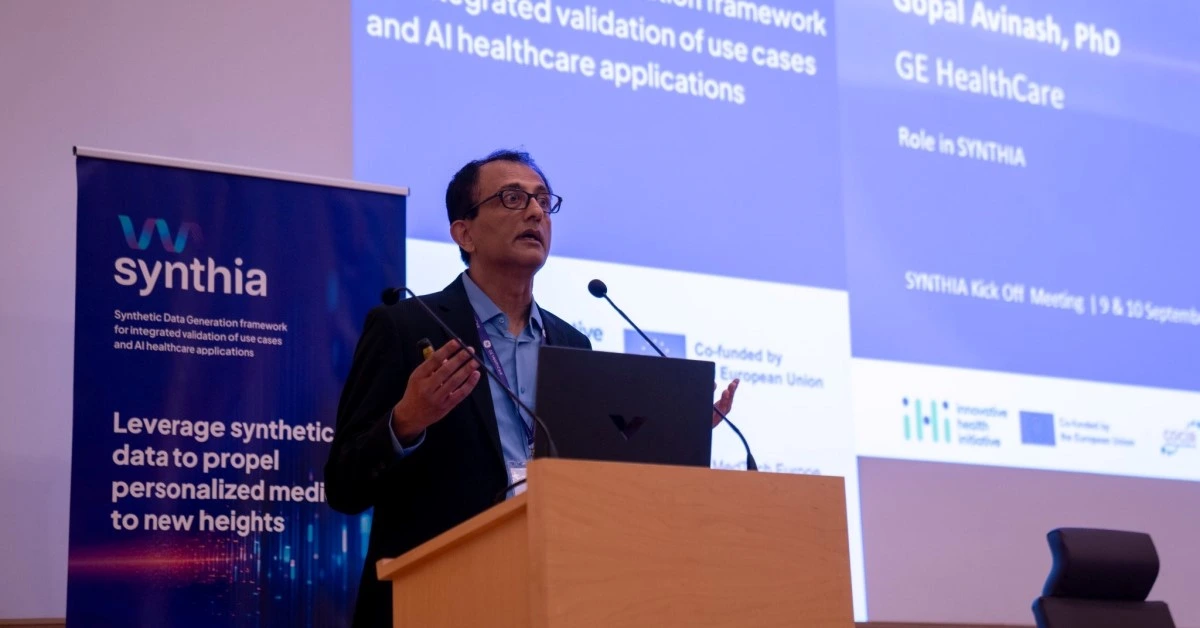
USA – GE HealthCare has announced its leadership role in Synthia, a consortium dedicated to advancing synthetic data generation for artificial intelligence (AI) in healthcare.
The initiative brings together a global team of healthcare industry leaders, including Gates Ventures, Novo Nordisk, Pfizer, and esteemed academic institutions like La Fe University, Fraunhofer Institute, and the University of Bologna.
The consortium will focus on developing synthetic datasets—artificially generated data designed to replicate real patient information—to fuel the next generation of AI algorithms aimed at healthcare applications.
As data becomes increasingly central to AI development, synthetic data offers a promising alternative, addressing issues like data scarcity, bias, and privacy concerns.
However, questions surrounding the reliability and quality of these datasets persist, which is why the Synthia project is so critical.
AI product development in healthcare relies heavily on access to vast amounts of high-quality data.
Yet, real-world data can be limited, biased, or difficult to obtain due to privacy regulations. Synthetic data, generated to mimic real patient data, could solve many of these challenges.
By creating diverse datasets that don’t carry the same privacy risks, researchers can develop more robust, generalizable AI models.
However, creating synthetic data isn’t without its challenges. “Synthetic data has huge potential to enhance research and product development in healthcare by augmenting available data,” said Gopal Avinash, Ph.D., VP, AI Smart Devices at GE HealthCare.
“Along with GE HealthCare’s AI strategy, synthetic data can help mitigate bias and drifts in algorithms and reduce privacy risks.
“We are excited to explore and develop these methods while enhancing standards and guidelines to build safe and effective synthetic data models.”
Addressing key health conditions
The Synthia project will assess synthetic data’s impact across multiple disease areas. These include oncology (lung and breast cancer), hematology (multiple myeloma and diffuse large B-cell lymphoma), neurology (Alzheimer’s disease), and metabolic health (type 2 diabetes).
This diverse scope allows the project to evaluate synthetic data’s effectiveness in varying medical conditions, enhancing its application in both diagnostics and treatments.
The project will generate high-quality synthetic datasets, including lab results, clinical notes, genomics, imaging, and mobile health data.
These datasets will be stored on a platform accessible to the research community, with tools designed to evaluate their privacy, quality, and relevance for different healthcare applications.
Ensuring ethical and safe data use
A major part of Synthia’s mission is to address the ethical, legal, and regulatory challenges associated with synthetic data.
The project aims to develop methods for ensuring that synthetic data not only protects patient privacy but also provides the accuracy needed for effective AI model development.
“Generating effective synthetic databases through artificial intelligence is the only viable way to uphold privacy while advancing precision medicine,” remarked Guillermo Sanz, Scientific Director at IISLaFe, La Fe University.
“We are honored to coordinate this innovative project, which could one day lead to the approval of new drugs and therapies, ultimately reducing costs and speeding up patient access to essential treatments.”
Fostering trust in synthetic data
Ultimately, Synthia aims to foster trust among healthcare stakeholders by proving the reliability of synthetic data for AI development.
With synthetic data tools covering a wide range of data types and diseases, the initiative holds the potential to transform clinical research, improving how AI models are developed and validated.
Amied Shadmaan, Director of AI & Clinical Collaborations at GE HealthCare, echoed the sentiment, saying, “We are honored and humbled to be working alongside world-leading experts across clinical and data science domains.
“The program’s objectives align well with our ambition to build safe and effective AI technology while ensuring we are maximizing the potential of synthetic data.”
XRP HEALTHCARE L.L.C | License Number: 2312867.01 | Dubai | © Copyright 2025 | All Rights Reserved